The Historical & Mythological Library
Ahavati
Tams
 124
124 Joined 11th Apr 2015
Joined 11th Apr 2015
Forum Posts: 17129
Tams
Tyrant of Words
 124
124Forum Posts: 17129
This thread is for historical events or mythological stories that interest us. Everyone is welcome here and may share whatever topics interest them as long as it's historical in nature.
I would request participants be kind and courteous to one another as outlined in the site guidelines. Off topic or posts that violate guidelines will be reported for removal.
I would request participants be kind and courteous to one another as outlined in the site guidelines. Off topic or posts that violate guidelines will be reported for removal.
Ahavati
Tams
 124
124 Joined 11th Apr 2015
Joined 11th Apr 2015
Forum Posts: 17129
Tams
Tyrant of Words
 124
124Forum Posts: 17129
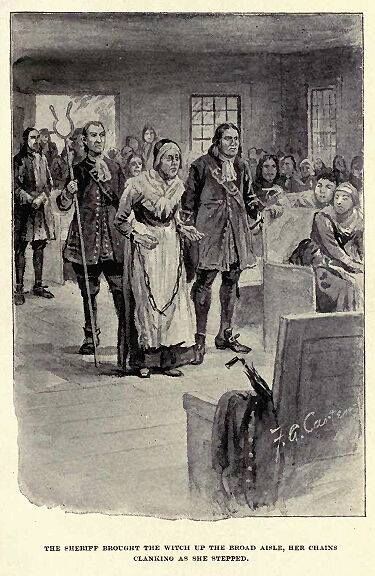
ON THIS DAY IN HISTORY – On 21st February, 1621, Rebecca Nurse, victim of the Salem witch trials, was born in Great Yarmouth, England but settled with her family in Salem Village, Massachusetts.
She was married in 1644 and had eight children. Together they regularly attended church and Nurse was seen as a model citizen of ‘exemplary piety’.
The Nurse family had been involved in a number of acrimonious land disputes with the Putnam family. On March 23, 1692, a warrant was issued for her arrest based upon accusations made by Edward and John Putnam.
Upon hearing of the accusations the frail 71-year-old Nurse, often described as an invalid, said, "I am innocent as the child unborn, but surely, what sin hath God found out in me unrepented of, that He should lay such an affliction on me in my old age."
There was a public outcry over the accusations made against her, as she was considered to be of very pious character. Nevertheless, the trial went ahead. In accordance with the procedures at the time, Mrs. Nurse, like others accused of witchcraft, represented herself since she was not allowed to have a lawyer represent her.
Many members of the community testified on her behalf. However the young Ann Putnam Jr. and the other children would break into fits and claim Nurse was tormenting them. The jury ruled Nurse not guilty.
But due to renewed fits and spasms by the girls, the jury asked the magistrate that the verdict be reconsidered. The jury changed their verdict, sentencing Nurse to death on July 19, 1692.
As was the custom, after Rebecca Nurse was hanged, her body was buried in a shallow grave near the gallows along with other convicted witches, who were considered unfit for proper burial.
Later, her accuser, Ann Putnam, Jr., publicly apologized to the Nurse family for accusing innocent people. In 1711, the government compensated the Nurse family for Rebecca's wrongful death.
Picture: Rebecca Nurse's trial from The Witch of Salem, or Credulity Run Mad by John R. Musick
via Ancient Origins
Ahavati
Tams
 124
124 Joined 11th Apr 2015
Joined 11th Apr 2015
Forum Posts: 17129
Tams
Tyrant of Words
 124
124Forum Posts: 17129
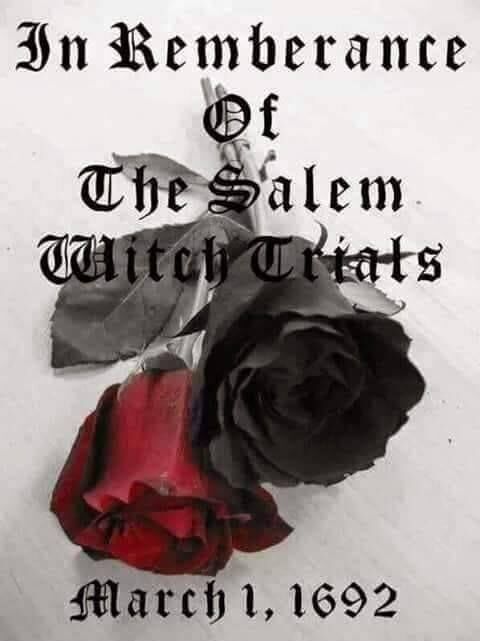
March 01 1692 #OTD
Salem Witch Hunt begins
In Salem Village in the Massachusetts Bay Colony, Sarah Goode, Sarah Osborne and Tituba, an enslaved woman from the Barbados, are charged with the illegal practice of witchcraft. Later that day, Tituba, possibly under coercion, confessed to the crime, encouraging the authorities to seek out more Salem witches.
Trouble in the small Puritan community began the month before, when nine-year-old Elizabeth Parris and 11-year-old Abigail Williams, the daughter and niece, respectively, of the Reverend Samuel Parris, began experiencing fits and other mysterious maladies.
A doctor concluded that the children were suffering from the effects of witchcraft, and the young girls corroborated the doctor’s diagnosis. With encouragement from a number of adults in the community, the girls, who were soon joined by other “afflicted” Salem residents, accused a widening circle of local residents of witchcraft, mostly middle-aged women but also several men and even one four-year-old child. During the next few months, the afflicted area residents incriminated more than 150 women and men from Salem Village and the surrounding areas of Satanic practices.
In June 1692, the special Court of Oyer, “to hear,” and Terminer, “to decide,” convened in Salem under Chief Justice William Stoughton to judge the accused. The first to be tried was Bridget Bishop of Salem, who was found guilty and executed by hanging on June 10.
Thirteen more women and four men from all stations of life followed her to the gallows, and one man, Giles Corey, was executed by crushing. Most of those tried were condemned on the basis of the witnesses’ behavior during the actual proceedings, characterized by fits and hallucinations that were argued to be caused by the defendants on trial.
In October 1692, Governor William Phipps of Massachusetts ordered the Court of Oyer and Terminer dissolved and replaced with the Superior Court of Judicature, which forbade the type of sensational testimony allowed in the earlier trials.
Executions ceased, and the Superior Court eventually released all those awaiting trial and pardoned those sentenced to death. The Salem Witch Trials, which resulted in the executions of 19 innocent women and men, had effectively ended.
Via a Heart Of A Witch Soul Of An Empath
Ahavati
Tams
 124
124 Joined 11th Apr 2015
Joined 11th Apr 2015
Forum Posts: 17129
Tams
Tyrant of Words
 124
124Forum Posts: 17129

Read this fascinating story about the Ancient Beekeeper Virgil:
Discover the Etymology of the motto:
"Sic vos non vobis mellificatis apes"
(Image Left)~ Publius Vergilius Maro, (70 - 19 BC). Ancient Roman writer and poet, beloved by Apiarians for his work, Georgics Book IV on the subject of beekeeping. (painting by Girolamo Troppa )
(Image Right)~The Swarming of Bees
Illustration by Wenceslaus Hollar, to Virgil's Georgics. circa. 1697
"Hi motus animorum atque haec certamina tanta, Pulveris exigui jactu compressa quiescunt." - Virgil, Georgics, Book IV, 29 B.C.E.
"These excitations of their passions, and these inveterate contests, will be quieted by the throwing up of a little dust." - Virgil, Georgics, Book IV, 29 B.C.E.
The story of the Latin phrase,
"Sic vos non vobis mellificatis apes."
The phrase has been quoted many times throughout history and has grown to great popularity among Apiarians,
The words were written by Publius Vergilius Maro (70 BC -19 BC.), also known by the Anglicized forms of his name as Virgil or Vergil. Virgil was a classical Roman poet, best known for three major works —the Eclogues, the Georgics, and the Aeneid —although several minor poems are also attributed to him. The son of a farmer, Virgil came to be regarded as one of Rome's greatest poets.
The poet Virgil is beloved among apiarists for his didactic poem titled The Georgics, which gave instruction in the methods of running a farm. The Georgics focus respectively in raising crops and trees in books I and II, livestock and horses in book III, and beekeeping and the qualities of bees in book IV.
The best estimate for the date of the origin of this phrase, is around the year 41 B.C. when Virgil was known to reside in Rome.
Virgil moved to the milder climate of Rome partly for the sake of his health, and partly on account of his growing reputation. Here, Virgil quickly become a favorite in the highest literary and court society. His acquaintance and friendship were sought by the most distinguished men and the favorite of the Muses, and became also the favorite of Augustus (Ceasar).
The young Caesar, not yet emperor, was easily accessible to the flattery of genius. Virgil, held a view to compliment his prince, and to express the happy state of the empire under his administration. According to the well-known anecdote, it was during his celebration of certain splendid games "a bright holiday following a stormy night" that Virgil posted a distich (a two line verse regarded as a single unit) during the night, on the gates of the palace of Augustus, praising him with an extravagant compliment, -highly flattering to the emperor, wishing him good luck. But the very modest Virgil did not inscribe the leaves with the his name.
The distich is written:
Nocte pluit tota; redeunt spectacula mane:
Divisum imperium cum Jove Caesar habet.
Translation:
All night it rains; spectacles shall return with the morning:
Caesar shares the power of Jupiter.
For a long time, Augustus sought to find who it could be that had written the verse, but was unable to discover who the author was. Virgil's modesty and diffidence prevented him from making an avowal. Then, a mediocre poet by the name of Bathyllus came forward to ascribe the distich to himself, and no one said a word. In consequence, Bathyllus received rewards of honor and gifts from Caesar.
This infuriated Virgil, and he did not take this sitting down. Angered that the profit and honor of his labors had been usurped by others, Virgil wrote the same distich again, followed with four incomplete half-lines on the same leaves, -and posted it on doorpost of Augustus's palace, letting the verses purposely unfinished.
Nocte pluit tota; redeunt spectacula mane:
Divisum imperium cum Jove Caesar habet.
Sic vos non vobis,
Sic vos non vobis,
Sic vos non vobis,
Sic vos non vobis,
Translation:
All night it rains; spectacles shall return with the morning:
Caesar shares the power of Jupiter.
Thus do ye, not for yourselves,
Thus do ye, not for yourselves,
Thus do ye, not for yourselves,
Thus do ye, not for yourselves,
Augustus wished to find the author; and as the surest way of doing it, demanded that the lines should be finished. Several attempts were made without effect. The emperor then asked Bathyllus if he could finish the lines, but he too was unable to fill out that which he claimed was owned himself, this led to a suspicion of his imposture. Others came forward and attempted the task in vain. Virgil then came to Augustus; finished the verses, and thus avowed himself the author of the previous distich, by completing the lines as follows;
Hos ego versiculos feci, tulit alter honores:
Sic vos non vobis nidificatis aves:
Sic vos non vobis vellera fertis oves:
Sic vos non vobis mellificatis apes:
Sic vos non vobis fertis aratra boves:
Translation:
I made these little verses, another took the honor.
Thus do ye, not for yourselves, make nests, ye birds.
Thus do ye, not for yourselves, render your fleece, ye sheep.
Thus do ye, not for yourselves, make honey, ye bees.
Thus do ye, not for yourselves, endure the plow, ye oxen.
Bathyllus, revealed as an impostor, was made a laughing-stock. Virgil then became one of the most honored and popular men in Rome. But Virgil, with constitutional shyness, it is said he would shrink into the nearest shop or alley to avoid the public gaze. Virgil went on to write some of his greatest works; the book of Georgics in 30 B.C., written in beautiful poetic verse, which included some of the earliest observations on bees in The Georgics Book IV.
From the time of old England, the motto has been generally used in its incomplete form, and the meaning subject to interpretation or context of use.
"Sic vos non vobis"
The shortened version is sometimes used by; persons who believe their labors have unduly profited others.
It is also used by schools, libraries as a motto meaning,
'We labor not for ourselves, but for others.'
OR 'This you do, not for yourselves'
As inscribed on the Seal of the Bank of England
"Sic vos non vobis"
"thus we labour but not for ourselves"
Source:
1. The Poems of Virgil By Virgil, Joseph Henry Allen,
William Francis Allen, James Bradstreet Greenough
-1877
2. The Bizarre Notes and Queries in History, Folk-lore,
Mathematics, Mysticism-
-1888
3. The Quarterly Musicial Magazine and Review
by Richard Mackenzie Bacon
-1818
4. Aelius Donatus, "Life of Virgil"
The Greater Poems of Virgil - Page viii
by Virgil
- 1894
Ahavati
Tams
 124
124 Joined 11th Apr 2015
Joined 11th Apr 2015
Forum Posts: 17129
Tams
Tyrant of Words
 124
124Forum Posts: 17129

A slice of England's iconic A303 road shows how it changed over thousands of years.
Ahavati
Tams
 124
124 Joined 11th Apr 2015
Joined 11th Apr 2015
Forum Posts: 17129
Tams
Tyrant of Words
 124
124Forum Posts: 17129

Image: The spot Julius Caesar was murdered.
Beware the Ides of March
Julius Caesar's assassination was the ancient world's most dramatic boardroom coup, proving that politics in Rome were more cutthroat than a season finale of your favorite political drama. Picture it: March 15th, 44 BC, a date that Caesar should have marked as "Busy: Avoid Senate" on his calendar.
Instead, he walks in, probably thinking it's just another day of empire running, when suddenly, his so-called friends and colleagues decide to redefine "backstabbing" in the most literal sense.
There's Caesar, ready to address the Senate, when Brutus, Cassius, and the gang pull out their knives, not for a surprise birthday cake, but for a surprise "retirement" party. Caesar's last words, rumored to be "Et tu, Brute?" or "You too, Brutus?" were the ancient equivalent of "I thought we were friends!" Imagine the awkward silence that followed, with everyone trying to act casual, like, "Whoops, did we just change the course of Western civilization? My bad."
In the end, Caesar's assassination was less about the end of a dictator and more about the world's worst case of miscommunication and overreaction. So, next time you're dreading a meeting, just be thankful your colleagues' idea of feedback doesn't involve daggers.
History:
https://roman-empire.net/places/this-is-the-spot-where-julius-caesar-was-assassinated/?fbclid=IwAR0Ywrj5PNXrzs6iSJIGtedqHzshS-R1EeVsWYRtOI6ZJYcPzu9791zvhO8
#inspiritualservice #astrology #astrologer #inspiritualserviceastrology #IdesOfMarch #romanempire #betrayal
Ahavati
Tams
 124
124 Joined 11th Apr 2015
Joined 11th Apr 2015
Forum Posts: 17129
Tams
Tyrant of Words
 124
124Forum Posts: 17129
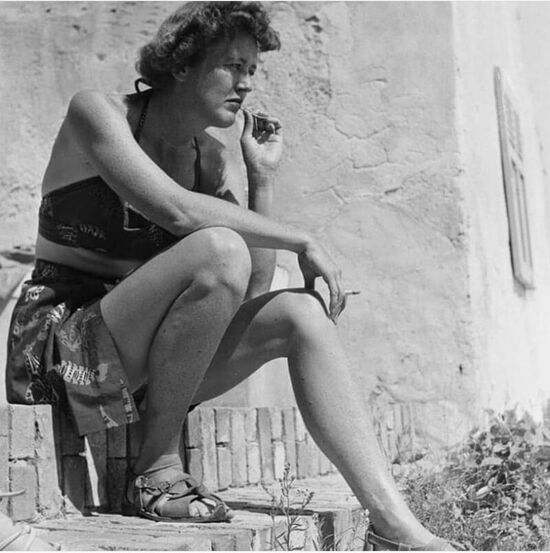
"My first big recipe was shark repellant that I mixed in a bathtub for the Navy, for the men who might get caught in the water."
Before she mastered the art of French cooking, Julia Child cooked up shark repellent while working for the precursor to the CIA as a covert operative during World War II. Sharks kept unintentionally setting off underwater explosives meant for German U-boats — until Child came up with an inventive recipe that saved the day.
Ahavati
Tams
 124
124 Joined 11th Apr 2015
Joined 11th Apr 2015
Forum Posts: 17129
Tams
Tyrant of Words
 124
124Forum Posts: 17129
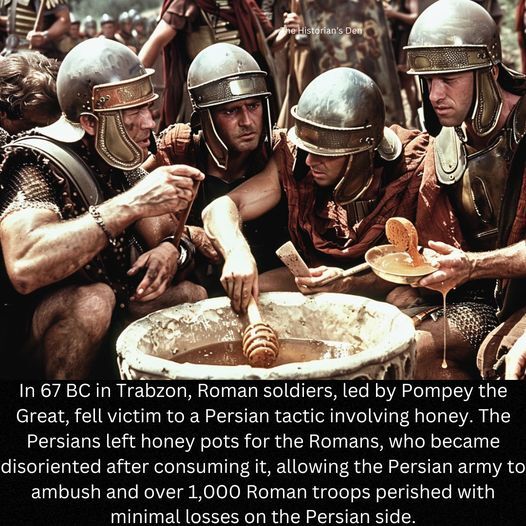
"Mad honey," a hallucinogenic variety originating in Eastern Turkey's Black Sea region, has a long and perilous history. Bees produce it from rhododendron flowers containing grayanotoxin, a potent neurotoxin. While consuming this honey can induce euphoria and hallucinations, excessive intake can lead to severe illness, even death.
Ancient accounts, such as Xenophon's in 401 B.C.E., recount the Greek army's suffering after consuming stolen honey, and Pompey the Great's troops' ambush in 67 B.C.E. by Persians who left honey deliberately. Today, mad honey remains a risky indulgence, mainly found in rural Turkey, though occasionally surfacing in the U.S. during specific blooming periods in the Appalachian Mountains.
https://research.tamu.edu/2014/11/03/how-eating-mad-honey-cost-pompey-the-great-1000-soldiers/?fbclid=IwAR0trGX_DVjOczFJQXSU6HSYYLVwJQoHR18yjsCriHZVMwxIZsdDRU64AR0
Ahavati
Tams
 124
124 Joined 11th Apr 2015
Joined 11th Apr 2015
Forum Posts: 17129
Tams
Tyrant of Words
 124
124Forum Posts: 17129

Because, God. . .I mean the cross in the middle of torturing someone seems so hypocritical, but that's what it's become.
Ahavati
Tams
 124
124 Joined 11th Apr 2015
Joined 11th Apr 2015
Forum Posts: 17129
Tams
Tyrant of Words
 124
124Forum Posts: 17129
May 11, 2024
HEATHER COX RICHARDSON
MAY 12, 2024
If you google the history of Mother’s Day, the internet will tell you that Mother’s Day began in 1908 when Anna Jarvis decided to honor her mother. But “Mothers’ Day”—with the apostrophe not in the singular spot, but in the plural—actually started in the 1870s, when the sheer enormity of the death caused by the Civil War and the Franco-Prussian War convinced writer and reformer Julia Ward Howe that women must take control of politics from the men who had permitted such carnage.
Mothers’ Day was not designed to encourage people to be nice to their mothers. It was part of women’s effort to gain power to change society. [ Let that sink in. ]
The Civil War years taught naïve Americans what mass death meant in the modern era. Soldiers who had marched off to war with fantasies of heroism discovered that newly invented long-range weapons turned death into tortured anonymity. Men were trampled into blood-soaked mud, piled like cordwood in ditches, or withered into emaciated corpses after dysentery drained their lives away.
The women who had watched their hale and healthy men march off to war were haunted by its results. They lost fathers, husbands, sons, and brothers. The men who did come home were scarred in both body and mind.
Modern war, it seemed, was not a game.
But out of the war also came a new sense of empowerment. Women had bought bonds, paid taxes, raised money for the war effort, managed farms, harvested fields, worked in war industries, reared children, and nursed soldiers. When the war ended, they had every expectation that they would continue to be considered valuable participants in national affairs, and had every intention of continuing to take part in them.
But the Fourteenth Amendment, which established that Black men were citizens, did not explicitly include women in that right. Worse, it introduced the word “male” into the Constitution when it warned states against preventing “male inhabitants” from voting. In 1869, the year after the Fourteenth Amendment was added to the Constitution, women organized two organizations—the National Woman Suffrage Association and the American Woman Suffrage Association—to promote women’s right to have a say in American government.
From her home in Boston, Julia Ward Howe was a key figure in the American Woman Suffrage Association. She was an enormously talented writer who in the early years of the Civil War had penned “The Battle Hymn of the Republic,” a hymn whose lyrics made it a point to note that Christ was “born of woman.”
Howe was drawn to women’s rights because the laws of her time meant that her children belonged to her abusive husband. If she broke free of him, she would lose any right to see her children, a fact he threw at her whenever she threatened to leave him. She was not at first a radical in the mold of reformer Elizabeth Cady Stanton, who believed that women had a human right to equality with men. Rather, she believed strongly that women, as mothers, had a special role to perform in the world.
For Howe, the Civil War had been traumatic, but that it led to emancipation might justify its terrible bloodshed. The outbreak of the Franco-Prussian War in 1870 was another story. She remembered:
“I was visited by a sudden feeling of the cruel and unnecessary character of the contest. It seemed to me a return to barbarism, the issue having been one which might easily have been settled without bloodshed. The question forced itself upon me, ‘Why do not the mothers of mankind interfere in these matters, to prevent the waste of that human life of which they alone know and bear the cost?’”
Howe had a new vision, she said, of “the august dignity of motherhood and its terrible responsibilities.” She sat down immediately and wrote an “Appeal to Womanhood Throughout the World.” Men always had and always would decide questions by resorting to “mutual murder,” she wrote, but women did not have to accept “proceedings which fill the globe with grief and horror.” Mothers could command their sons, “who owe their life to her suffering,” to stop the madness.
"Arise, women!” Howe commanded. “Say firmly: ‘We will not have great questions decided by irrelevant agencies. Our husbands shall not come to us, reeking with carnage, for caresses and applause. Our sons shall not be taken from us to unlearn all that we have been able to teach them of charity, mercy and patience. We, women of one country, will be too tender of those of another country, to allow our sons to be trained to injure theirs.’”
Howe had her document translated into French, Spanish, Italian, German, and Swedish and distributed it as widely as her extensive contacts made possible. She believed that her Women’s Peace Movement would be the next great development in human history, ending war just as the antislavery movement had ended human bondage. She called for a “festival which should be observed as mothers’ day, and which should be devoted to the advocacy of peace doctrines” to be held around the world on June 2 of every year, a date that would permit open-air meetings.
Howe organized international peace conferences, and American states developed their own Mothers’ Day festivals. But Howe quickly realized that there was much to be done before women could come together on a global scale. She turned her attention to women’s clubs “to constitute a working and united womanhood.”
As Howe worked to unite women, she came to realize that a woman did not have to center her life around a man, but rather should be “a free agent, fully sharing with man every human right and every human responsibility.” “This discovery was like the addition of a new continent to the map of the world,” she later recalled, “or of a new testament to the old ordinances.” She threw herself into the struggle for women’s suffrage, understanding that in order to create a more just and peaceful society, women must take up their rightful place as equal participants in American politics.
While we celebrate the modern version of Mother’s Day on May 12, in this momentous year of 2024 it’s worth remembering the original Mothers’ Day and Julia Ward Howe’s conviction that women must have the same rights as men, and that they must make their voices heard.
—
Notes: https://heathercoxrichardson.substack.com/p/may-11-2024
HEATHER COX RICHARDSON
MAY 12, 2024
If you google the history of Mother’s Day, the internet will tell you that Mother’s Day began in 1908 when Anna Jarvis decided to honor her mother. But “Mothers’ Day”—with the apostrophe not in the singular spot, but in the plural—actually started in the 1870s, when the sheer enormity of the death caused by the Civil War and the Franco-Prussian War convinced writer and reformer Julia Ward Howe that women must take control of politics from the men who had permitted such carnage.
Mothers’ Day was not designed to encourage people to be nice to their mothers. It was part of women’s effort to gain power to change society. [ Let that sink in. ]
The Civil War years taught naïve Americans what mass death meant in the modern era. Soldiers who had marched off to war with fantasies of heroism discovered that newly invented long-range weapons turned death into tortured anonymity. Men were trampled into blood-soaked mud, piled like cordwood in ditches, or withered into emaciated corpses after dysentery drained their lives away.
The women who had watched their hale and healthy men march off to war were haunted by its results. They lost fathers, husbands, sons, and brothers. The men who did come home were scarred in both body and mind.
Modern war, it seemed, was not a game.
But out of the war also came a new sense of empowerment. Women had bought bonds, paid taxes, raised money for the war effort, managed farms, harvested fields, worked in war industries, reared children, and nursed soldiers. When the war ended, they had every expectation that they would continue to be considered valuable participants in national affairs, and had every intention of continuing to take part in them.
But the Fourteenth Amendment, which established that Black men were citizens, did not explicitly include women in that right. Worse, it introduced the word “male” into the Constitution when it warned states against preventing “male inhabitants” from voting. In 1869, the year after the Fourteenth Amendment was added to the Constitution, women organized two organizations—the National Woman Suffrage Association and the American Woman Suffrage Association—to promote women’s right to have a say in American government.
From her home in Boston, Julia Ward Howe was a key figure in the American Woman Suffrage Association. She was an enormously talented writer who in the early years of the Civil War had penned “The Battle Hymn of the Republic,” a hymn whose lyrics made it a point to note that Christ was “born of woman.”
Howe was drawn to women’s rights because the laws of her time meant that her children belonged to her abusive husband. If she broke free of him, she would lose any right to see her children, a fact he threw at her whenever she threatened to leave him. She was not at first a radical in the mold of reformer Elizabeth Cady Stanton, who believed that women had a human right to equality with men. Rather, she believed strongly that women, as mothers, had a special role to perform in the world.
For Howe, the Civil War had been traumatic, but that it led to emancipation might justify its terrible bloodshed. The outbreak of the Franco-Prussian War in 1870 was another story. She remembered:
“I was visited by a sudden feeling of the cruel and unnecessary character of the contest. It seemed to me a return to barbarism, the issue having been one which might easily have been settled without bloodshed. The question forced itself upon me, ‘Why do not the mothers of mankind interfere in these matters, to prevent the waste of that human life of which they alone know and bear the cost?’”
Howe had a new vision, she said, of “the august dignity of motherhood and its terrible responsibilities.” She sat down immediately and wrote an “Appeal to Womanhood Throughout the World.” Men always had and always would decide questions by resorting to “mutual murder,” she wrote, but women did not have to accept “proceedings which fill the globe with grief and horror.” Mothers could command their sons, “who owe their life to her suffering,” to stop the madness.
"Arise, women!” Howe commanded. “Say firmly: ‘We will not have great questions decided by irrelevant agencies. Our husbands shall not come to us, reeking with carnage, for caresses and applause. Our sons shall not be taken from us to unlearn all that we have been able to teach them of charity, mercy and patience. We, women of one country, will be too tender of those of another country, to allow our sons to be trained to injure theirs.’”
Howe had her document translated into French, Spanish, Italian, German, and Swedish and distributed it as widely as her extensive contacts made possible. She believed that her Women’s Peace Movement would be the next great development in human history, ending war just as the antislavery movement had ended human bondage. She called for a “festival which should be observed as mothers’ day, and which should be devoted to the advocacy of peace doctrines” to be held around the world on June 2 of every year, a date that would permit open-air meetings.
Howe organized international peace conferences, and American states developed their own Mothers’ Day festivals. But Howe quickly realized that there was much to be done before women could come together on a global scale. She turned her attention to women’s clubs “to constitute a working and united womanhood.”
As Howe worked to unite women, she came to realize that a woman did not have to center her life around a man, but rather should be “a free agent, fully sharing with man every human right and every human responsibility.” “This discovery was like the addition of a new continent to the map of the world,” she later recalled, “or of a new testament to the old ordinances.” She threw herself into the struggle for women’s suffrage, understanding that in order to create a more just and peaceful society, women must take up their rightful place as equal participants in American politics.
While we celebrate the modern version of Mother’s Day on May 12, in this momentous year of 2024 it’s worth remembering the original Mothers’ Day and Julia Ward Howe’s conviction that women must have the same rights as men, and that they must make their voices heard.
—
Notes: https://heathercoxrichardson.substack.com/p/may-11-2024
Ahavati
Tams
 124
124 Joined 11th Apr 2015
Joined 11th Apr 2015
Forum Posts: 17129
Tams
Tyrant of Words
 124
124Forum Posts: 17129
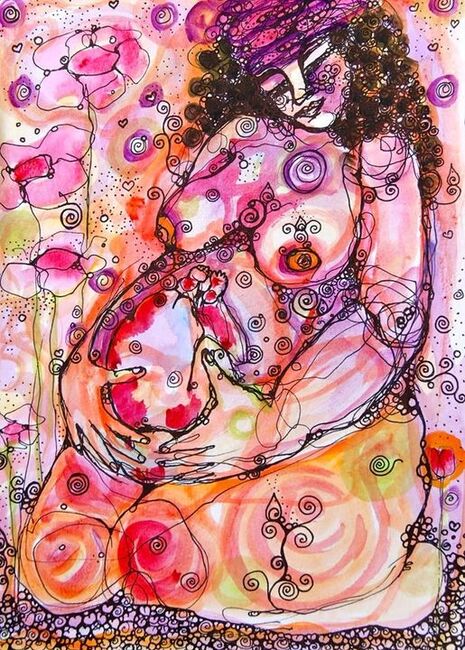
''All the eggs a woman will ever carry form in her ovaries while she is a four-month-old fetus in the womb of her mother.
This means our cellular life as an egg begins in the womb of our grandmother.
Each of us spent five months in our grandmother's womb, and she in turn formed in the womb of her grandmother.
We vibrate to the rhythm of our mother's blood before she herself is born, and this pulse is the thread of blood that runs all the way back through the grandmothers to the first mother."
~ Layne Redmond, When The Drummers Were Women
Art by Arna Baartz
Ahavati
Tams
 124
124 Joined 11th Apr 2015
Joined 11th Apr 2015
Forum Posts: 17129
Tams
Tyrant of Words
 124
124Forum Posts: 17129

Today is the 80th anniversary of D-Day - When most of the world stood arm-in-arm against terror.
It’s nearly impossible to imagine the scale of the D-Day invasion. On a single day—June 6, 1944—more than 156,000 American, British and Canadian troops executed the largest amphibious landing in history. It required nearly 7,000 ships and landing vessels, more than 2,300 aircraft and 867 gliders.
The invasion, known as Operation Overlord, was years in the making, long enough for Germany to construct miles of fortified beach defenses armed with machine guns, heavy artillery and anti-aircraft batteries. The brave young men who stormed the beaches of Normandy or parachuted behind enemy lines experienced some of the heaviest and deadliest fighting of the war.
Here are five of their stories.
https://www.history.com/news/d-day-veteran-stories-video?utm_source=facebook&utm_medium=social&utm_campaign=dhfacebook&utm_content=null&fbclid=IwZXh0bgNhZW0CMTEAAR2C8OcZZEM8mMzyFBONGqNoWxEQbWYBSd9KgN2XbEp3f-A3PVfwI6OkdaA_aem_AXVVXwvdU24QgEjJ0sHVxCOYnmyIb8zwz7ox_SFiKRzXJ3s-uljCzP1cmUcrS8wY2-5ddBkm_6Nqi90eSjTBun7A
Ahavati
Tams
 124
124 Joined 11th Apr 2015
Joined 11th Apr 2015
Forum Posts: 17129
Tams
Tyrant of Words
 124
124Forum Posts: 17129

I thought this apropos in regard to the conjunction tomorrow with Algol, representing Medusa's head.
The Bronze Head of Medusa, found at Hadrian’s Villa near Tivoli, Italy, is a notable Roman artifact. Medusa, a well-known figure from Greek mythology, is portrayed with snake-like hair and a fierce gaze. In Greek art, she symbolized protection, used to ward off evil with her menacing appearance.
Medusa, one of the three Gorgons, had the power to turn anyone who looked at her into stone. Her image continued to be significant in Roman times, showcasing the influence of Greek art on Roman culture. Hadrian’s Villa, where the Medusa head was discovered, is a UNESCO World Heritage Site renowned for its architectural complexity and historical significance, reflecting the grandeur of Roman imperial architecture.
Ahavati
Tams
 124
124 Joined 11th Apr 2015
Joined 11th Apr 2015
Forum Posts: 17129
Tams
Tyrant of Words
 124
124Forum Posts: 17129

61 years ago today, hundreds of thousands of people marched on Washington to demand jobs and freedom.
That day was a call to action for our nation. It helped rally advocates and elected officials to secure landmark legislative victories in the fight for progress, including the Civil Rights Act of 1964 and Voting Rights Act of 1965.
Today, we celebrate that progress and know that our work continues. We recommit ourselves to the fight for equity, opportunity, and justice for every American.
mysteriouslady
 15
15 Joined 11th Aug 2012
Joined 11th Aug 2012
Forum Posts: 2650
Tyrant of Words
 15
15Forum Posts: 2650
Theres 100s of 1000s that CAN go to work yet they DONT due to they get their means for FREE from our corrupt government. Bring something new to your copying and pasting.....Its very old, yet still entertaining, and a little scary....#trump24














